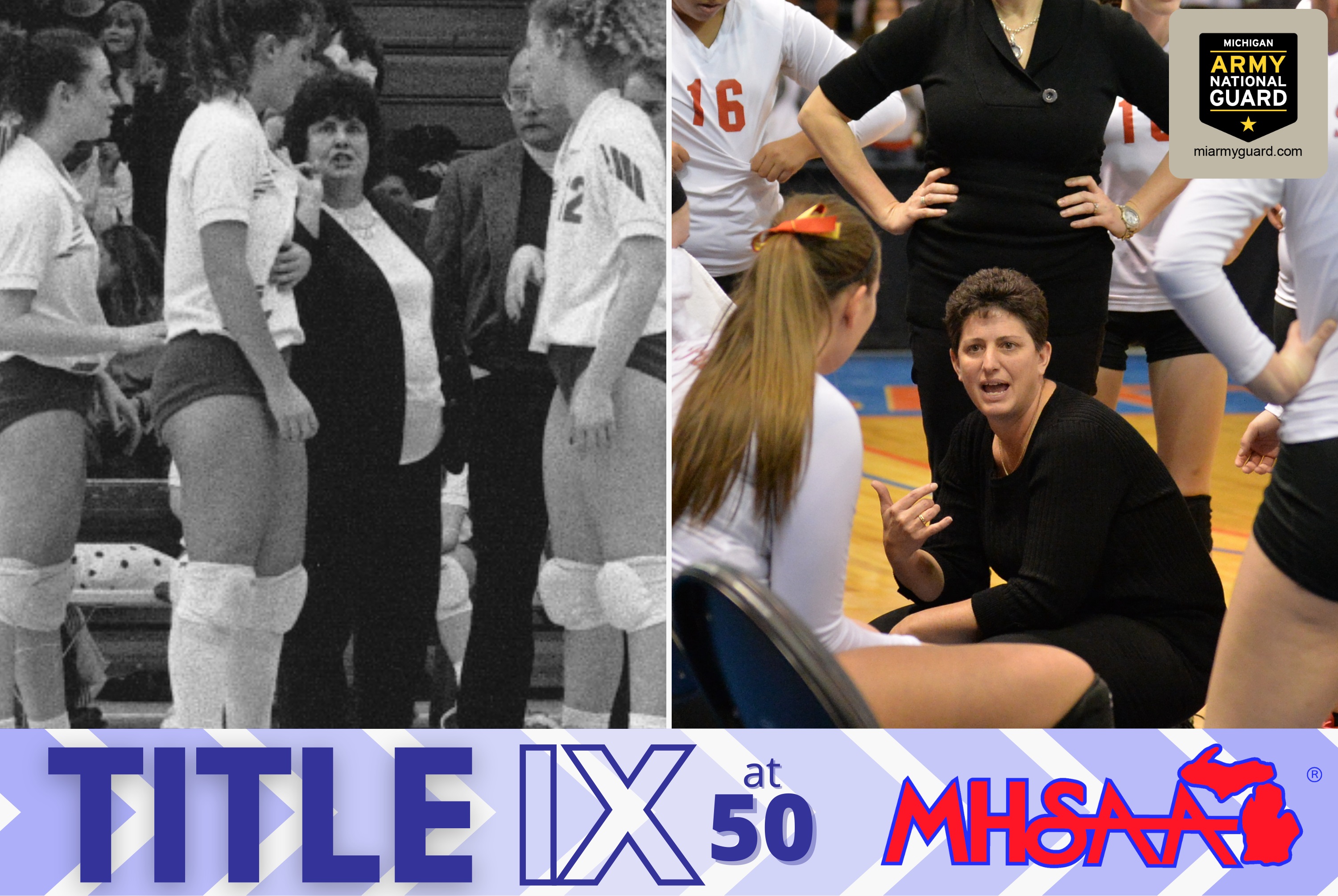
Title IX at 50: Guerra/Groat Legacy Continues to Serve St. Philip Well
By
Geoff Kimmerly
MHSAA.com senior editor
September 14, 2021
Nearly 100 years of MHSAA history have yielded plenty of multiple-generation coaching families, and a number of those have guided multiple generations of athletes to great success.
But what Battle Creek St. Philip volleyball coaches Sheila Guerra and her daughter Vicky (Guerra) Groat have accomplished is unmatched among coaching legacies – with their individual accomplishments also stacking up well with the rest of the state’s legends on the volleyball sideline.
Last season’s five-set win over Auburn Hills Oakland Christian in the Division 4 title decider gave the Tigers 21 Finals championships in the sport – more than twice the next program on the list. The championship match appearance was St. Phil’s 30th – also more than twice as many as the next most successful team.
Guerra took over the program to start the 1981-82 season (when volleyball was still played during the winter) and finished in 1997 with a record of 862-180-46, with those 862 victories still ranking 25th on the all-time MHSAA volleyball coaching wins list. She led the Tigers to nine Class D championships, including four straight from 1992-96, and two runner-up finishes.
Groat – who graduated from St. Phil in 1985 – followed her mom taking over for the 1997-98 season, leading that team to a Class D runner-up finish, but then stepping away after 1998-99. She returned a season later and has run her record to 1,179-275-93 heading into this fall – with the sixth-most wins in MHSAA history. She’s led 11 teams to Finals championships, 10 in Class D and last season’s in Division 4, plus six more runner-up finishes. The Tigers won a record nine-straight titles beginning with the final winter season of 2006-07 through the fall of 2014.
Second Half's weekly Title IX Celebration posts are sponsored by Michigan Army National Guard.
Previous Title IX at 50 Spotlights
Sept. 7: Best-Ever Conversation Must Include Leland's Glass - Read
Aug. 31: We Will Celebrate Many Who Paved the Way - Read

Five Fewer Volleyball Days?
December 12, 2017
When 90 percent of one of our key constituent groups has the same opinion, it’s worth talking about – even if the topic is a sacred cow.
This fall, 89.6 percent of 580 survey respondents told the Michigan High School Athletic Association they favor a week earlier end to the girls volleyball season.
Even more – 91.7 percent – favor starting practice two days earlier in August, the same day practice starts for football.
More than 98 percent of those respondents were local athletic directors, and each class (A, B, C and D) was almost equally represented.
If girls volleyball ended a week earlier, it would always conclude before the start of firearm deer hunting season and have a weekend largely to itself, in contrast to the current calendar that sees the Girls Volleyball Finals competing with the Girls Swimming & Diving Finals, the 8-Player Football Finals and 16 Semifinal games in the 11-Player Football Tournament. It’s a weekend of 100 audio and video broadcast hours, among the MHSAA’s very busiest weekends of the entire school year.
The MHSAA’s Girls Volleyball Tournament is the latest finishing high school association Girls Volleyball Tournament in the country, sharing that distinction with nine other states. Compared to our neighbors, the tournament in Michigan ends a week later than the Girls Volleyball Tournament ends in Illinois and Ohio, and two weeks later than the same tournament ends in Indiana and Wisconsin. Michigan’s girls volleyball season is currently one day shorter than in Ohio but four days longer than in Indiana, eight days longer than in Illinois, and 12 days longer than in Wisconsin.
Whether or not girls or boys basketball seasons eventually move up or back or flip-flop, the start and end of girls volleyball season are ripe for review, according to a large portion of local-level administrators. The opposite position is taken by the Michigan Interscholastic Volleyball Coaches Association, which has countered the online survey with a position paper that points out how much the girls volleyball season was shortened after girls volleyball moved from the winter season to the fall.
The Representative Council’s recent decision to switch the starting dates for girls and boys basketball seasons in the 2018-19 school year diminishes the urgency to decide between these different points of view.

